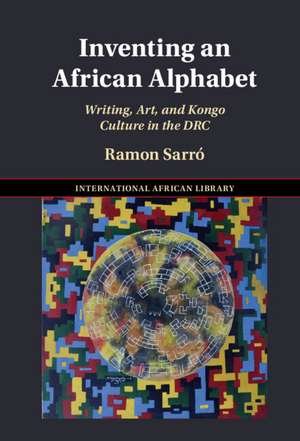Inventing an African Alphabet: Writing, Art, and Kongo Culture in the DRC: The International African Library, cartea 69
Autor Ramon Sarróen Limba Engleză Hardback – 22 feb 2023
| Toate formatele și edițiile | Preț | Express |
|---|---|---|
| Paperback (1) | 264.64 lei 6-8 săpt. | |
| Cambridge University Press – 19 sep 2024 | 264.64 lei 6-8 săpt. | |
| Hardback (1) | 636.18 lei 6-8 săpt. | |
| Cambridge University Press – 22 feb 2023 | 636.18 lei 6-8 săpt. |
Din seria The International African Library
-
 Preț: 230.54 lei
Preț: 230.54 lei -
 Preț: 230.79 lei
Preț: 230.79 lei -
 Preț: 229.90 lei
Preț: 229.90 lei - 9%
 Preț: 592.44 lei
Preț: 592.44 lei -
 Preț: 282.48 lei
Preț: 282.48 lei -
 Preț: 264.64 lei
Preț: 264.64 lei -
 Preț: 202.36 lei
Preț: 202.36 lei - 11%
 Preț: 583.36 lei
Preț: 583.36 lei - 14%
 Preț: 891.04 lei
Preț: 891.04 lei - 11%
 Preț: 636.34 lei
Preț: 636.34 lei -
 Preț: 226.17 lei
Preț: 226.17 lei -
 Preț: 285.37 lei
Preț: 285.37 lei -
 Preț: 323.27 lei
Preț: 323.27 lei -
 Preț: 289.01 lei
Preț: 289.01 lei -
 Preț: 326.15 lei
Preț: 326.15 lei -
 Preț: 287.66 lei
Preț: 287.66 lei -
 Preț: 288.25 lei
Preț: 288.25 lei -
 Preț: 285.54 lei
Preț: 285.54 lei -
 Preț: 285.54 lei
Preț: 285.54 lei -
 Preț: 306.47 lei
Preț: 306.47 lei -
 Preț: 285.75 lei
Preț: 285.75 lei -
 Preț: 284.17 lei
Preț: 284.17 lei -
 Preț: 285.37 lei
Preț: 285.37 lei -
 Preț: 283.03 lei
Preț: 283.03 lei -
 Preț: 279.76 lei
Preț: 279.76 lei -
 Preț: 281.30 lei
Preț: 281.30 lei -
 Preț: 282.48 lei
Preț: 282.48 lei -
 Preț: 213.63 lei
Preț: 213.63 lei - 11%
 Preț: 585.59 lei
Preț: 585.59 lei
Preț: 636.18 lei
Preț vechi: 714.81 lei
-11% Nou
Puncte Express: 954
Preț estimativ în valută:
121.73€ • 127.36$ • 101.12£
121.73€ • 127.36$ • 101.12£
Carte tipărită la comandă
Livrare economică 02-16 aprilie
Preluare comenzi: 021 569.72.76
Specificații
ISBN-13: 9781009199490
ISBN-10: 1009199498
Pagini: 332
Dimensiuni: 152 x 229 x 14 mm
Greutate: 0.46 kg
Editura: Cambridge University Press
Colecția Cambridge University Press
Seria The International African Library
Locul publicării:Cambridge, United Kingdom
ISBN-10: 1009199498
Pagini: 332
Dimensiuni: 152 x 229 x 14 mm
Greutate: 0.46 kg
Editura: Cambridge University Press
Colecția Cambridge University Press
Seria The International African Library
Locul publicării:Cambridge, United Kingdom
Cuprins
List of figures; List of maps; List of Glyphs; Acknowledgments; Part I. Introduction: 1. A writing lesson (in Luanda); Part II. Biography: 2. N'kamba: the road to revelation; 3. Kinshasa: the road to the university; 4. The eagle and the silk-cotton tree: my road with Wabeladio; Part III. Writing, Art, and Kongo Culture: 5. The road to the alphabet: the basics of Mandombe; 6. On the Kongo road writing and entrapping culture; 7. The road to art: the basics of Kimbanbula; 8. A different road: reading Wabeladio's 'Method of Discovery'; Part IV. Discussion: 9. How to make words with bricks: some final thoughts on creativity; Bibliography; Index.
Recenzii
'A truly fascinating book about a no less fascinating character and his inspired invention of an alphabet! Ramon Sarró explores in original ways the productive tensions between science, art and religion. In doing so, he offers us a brilliant reflection on the very process of human creativity.' Julien Bonhomme, École Normale Supérieure
'Written with compassion, sincerity, and respect, Sarró privileges the voices of Wabeladio Payi and his Congolese interlocutors as the book deftly merges biography, reflection, and ethnography. This intriguing text will shape discussions of identity, religion, Kongo nationalism, and anthropological approaches to creativity and innovation for years to come.' Yolanda Covington-Ward, University of Pittsburgh
'An authentic and significant work. It is ethnographically rooted, ethically correct, and scholarly tested. Sarro breathes new life into Kongo studies. The topic of this book, Mandombe, encapsulates thoughts about Kongo socio-cultural phenomena. A book for those interested in African ontology, history, and savoir-faire, particularly the Kongo.' Adrien N. Ngudiankama, President and Founder of Kongo Academy, Inc.
'A multifaceted exploration of Kimbanguism, Kongo culture and expressions of identity, Sarro examines Wabeladio Payi's system of writing to explore human creativity and epistemology in a religious register. The evocative descriptions and lyrical prose that centre the enquiry around the relationship between Payi and Sarro make this an unusual and beautiful study.' Emma Wild-Wood, University of Edinburgh
'Written with compassion, sincerity, and respect, Sarró privileges the voices of Wabeladio Payi and his Congolese interlocutors as the book deftly merges biography, reflection, and ethnography. This intriguing text will shape discussions of identity, religion, Kongo nationalism, and anthropological approaches to creativity and innovation for years to come.' Yolanda Covington-Ward, University of Pittsburgh
'An authentic and significant work. It is ethnographically rooted, ethically correct, and scholarly tested. Sarro breathes new life into Kongo studies. The topic of this book, Mandombe, encapsulates thoughts about Kongo socio-cultural phenomena. A book for those interested in African ontology, history, and savoir-faire, particularly the Kongo.' Adrien N. Ngudiankama, President and Founder of Kongo Academy, Inc.
'A multifaceted exploration of Kimbanguism, Kongo culture and expressions of identity, Sarro examines Wabeladio Payi's system of writing to explore human creativity and epistemology in a religious register. The evocative descriptions and lyrical prose that centre the enquiry around the relationship between Payi and Sarro make this an unusual and beautiful study.' Emma Wild-Wood, University of Edinburgh
Notă biografică
Descriere
Combines biography, art, and religion to explore Kongo identity and culture, and the relationship between innovation and revelation.
